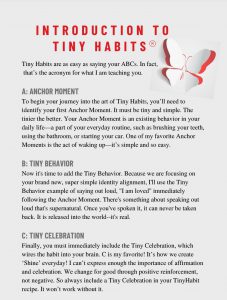Week 2: Goals Don’t Work. Systems Do.
Week 2: Goals Don’t Work. Systems Do.

Have you ever made a New Year’s resolution? Then you know how those commonly work out. Not so great, right?
There’s no reason to play the guilt, shame, and self-condemnation game. These types of personal failures have nothing to do with a lack of willpower. Instead, they have everything to do with a fundamental misunderstanding of how human behavior was designed to work.
Goals are nice, but they’re too vague and abstract—humans are designed to move forward incrementally and systematically toward concrete objectives. This is why, for most of us, goals don’t work for sustained results. We’re culturally conditioned to believe that big leaps lead to big results. The whole go-big-or-go-home mindset is based on a flawed idea. Big leaps and motivation waves are profitable for fitness clubs, but they don’t work for most individuals. Big leaps are unsustainable, but good systems and strategies built on tiny, concrete objectives will always lead to favorable outcomes.
God is a systems guy, and His design for human behavior is systematic.
The cycle of trying, failing, and then blaming yourself can end today, because human behavior is not random or unpredictable—it’s systematic. Once you understand how human behavior actually works, you can design systems that will keep you moving forward for good. We were lovingly designed to grow and move forward toward through small, one-at-a-time baby steps. This is why we start life as tiny, helpless babies: Love from God is experienced incrementally and expressed as we grow.
Your personal system designed for recovery will work as you walk it out, seeking God’s perspective on your progress, one tiny choice after the next.

Photo by Giorgio Trovato, courtesy of Unsplash
Suppose you want to get rid of a bad habit, such as bingeing on ice cream (one of my former bad habits that became an addiction). Whenever you feel depressed (prompted by sadness), using the Behavior Model and Tiny Habits, you can create your own systematic Master Plan that will work best for you—one tiny choice at a time.
Each Tiny Habit carried out successfully leads to a tiny victory and cause for everyday celebrations. I’ll tell you how this has worked for me and for so many others.
A good first strategic step is choosing to slow down and make time to find out specifically what you’re grieving.
Next, take action in the tiniest, simplest way you can. Break a behavior down to its smallest form. For example, when prompted by my sadness, I journaled for two to five minutes at a time. Each time my sadness showed up, I journaled specifically about that feeling.
Through this tiny, strategic journaling activity, I realized in time that what I was actually looking for was nurture, provision, protection, and the sense of home I never received during my growing-up years. Even the hope of that nurture was gone because my only remaining parent was gone. Realizing this was an aha moment for me that enabled me to ask myself some very important questions:
Why am I still looking for something that’s impossible to find?
Why am I still trying to find or earn a type of love that was never meant to be a part of my story on this side of heaven?
The tiny two- to five-minute journal entries helped me see clearly that I was looking for closure for and resolution to all the situations directly related to my chaotic, abusive childhood. I also often do a tiny meditation with three deep breaths, which specifically helps in the alleviation of PTSD symptoms in my body and mind. The breathing calms my stress response systems and reminds me that I am safe, provided for, and protected—no matter what happens, God is near and I’m going to be okay.
The system you create is customized for you. Your consistent and faithful good work will reveal many good things about you, and it won’t take long for you to see the trauma-created fog clearing. Your energy will incrementally increase and your stress will decline as the pace of life slows down for you. It really does feel miraculous, because it’s built on love.
Making tiny, intentional, healthy self-care decisions affirms your worth and value as a person. You slowly begin to see that your needs are just as important as the needs of others.
A loving self-care system based on how human behavior actually works will help you move forward empowered and equipped to finally let the unhealthy responses to the prompt of sadness go. As you begin to live your life on purpose, your perspective and identity will begin to shift toward the light.
Continue to practice your ABCs:
A = Anchor Moment
B = Tiny Behavior
C = Tiny Celebration
If you need a refresher for how the ABCs work, you can open the link below and read the sheet or print it out and stick it on your bathroom mirror!
Download HERE.
Activity
In addition to practicing your ABCs, here is an activity you can do this week:
Make space in your day so that you can stop and journal whenever you feel sadness.
- Have a writing app ready for when you need to stop and write. Better yet, carry a pen and a small notebook.
- Write for two to five minutes—no more. Keep it tiny. 😊
You can consider this a Tiny Habit in itself, so when you’re done writing, remember to celebrate in some small way! 🥳🎉🥳🎉🥳
Next week, you will discover the Trauma Recovery Tool Kit. Get ready to build! Until then, keep practicing your ABCs. So glad we are doing this journey together.
Mark your calendar for Wednesday, August 4, 2021. I’ll be hosting an Amazon live stream event, Moving from Trauma to Faith. It will be a short talk (under an hour) with lots of time for questions. Come on and join the party!
Learn more HERE.
Let’s keep the conversation going.
Instagram: @tiny_habits_for_soul_care; @navpressbooks // #youareworththework #tinyhabitsforyourhealingjourney #tinyhabits

